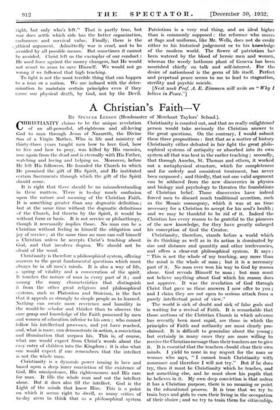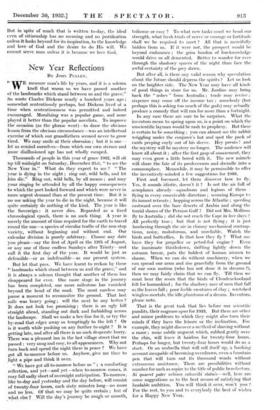A Christian's Faith—V
(Headmaster of Merchant Taylors' School.). By SPENCER LEESON CHRISTIANITY claims to be the unique revelation of an all-powerful, all-righteous and all-loving God to man through Jesus of Nazareth, the Divine Son of a Virgin Mother, Who in life and ministry of thirty-three years taught men how to love God, how to live and how to pray, was killed by His enemies, rose again from the dead and is eternally with His Father, watching and loving and helping us. Moreover, before He left His followers, He founded the Church to which He promised the gift of His Spirit, and He instituted certain Sacraments through which the gift of the Spirit should come.
It is right that there should be no misunderstanding in these matters. There is to-day much confusion upon the nature and meaning of the Christian Faith. It is something greater than any dogmatic definition ; but at the same time without the dogmatic definitions of the Church, led thereto by the Spirit, it would be without form or basis. It is not service or philanthropy, hough it necessarily implies those. No man can be a Christian without feeling in himself the obligation and joy of service ; at the same time no man can call himself a Christian unless he accepts Christ's teaching about God, and that involves dogma. We should not be afraid of the word.
Christianity is therefore a philosophical system, offering answers to the great fundamental questions which must always be in all men's minds. It is also a way of life, a spring of vitality and a consecration of the spirit. It touches the nature of man in every part of it ; and- among the many characteristics that distinguish it from the other great religious and philosophical systems, such as Platonism and Stoicism, is the fact that it appeals as strongly to simple people as to learned. Nothing can create more reverence and humility in the would-be scholar and thinker than to observe the sure grasp and knowledge of the Faith possessed by men and women of education inferior to his own ; who cannot follow his intellectual processes, and yet have reached, and, what is more, can demonstrate in action, a conviction and illumination that surpass his. This is, of course, what one would expect from Christ's words about the easy entry of children into the Kingdom ; it is also what one would expect if one remembers that the intellect is not the whole man.
Christianity is a dynamic power issuing in love and based upon a deep inner conviction of the existence of God, His omnipotence, His righteousness and His care for man. It fills the whole man and not the intellect alone. But it does also fill the intellect.- God is the Light of the minds that know Him. This is a point on which it seems right to dwell, as many critics of to-day seem to think that as a philosophical system Christianity is counted out, and that no really enlightened person would take seriously the Christian answer to the great questions. On the contrary, I would submit these three propositions : first that as a matter of history Christianity either defeated in fair fight the great philo- sophical systems of antiquity or absorbed into its own system all that was best in the earlier teaching ; secondly, that through Anselm, St. Thomas and others, it worked out a metaphysical structure, which for completeness and for orderly and consistent treatment, has never been surpassed ; and thirdly, that not one valid argument can be adduced from the new discoveries in physics and biology and psychology to threaten the foundations of Christian belief. Those discoveries have indeed forced men to discard much traditional accretion, such as the Mosaic cosmogony, which it was at no time necessary for a Christian to accept for his soul's health ; and we may be thankful to be rid of it. Indeed the Christian has every reason to be grateful to the pioneers of the new knowledge, for they have greatly enlarged his conception of God the Creator.
Christianity, therefore, stands before a world which in its thinking as well as in its action is dominated by size and distance and quantity and other irrelevancies, and offers a clear-cut philosophical system. It says : " This is not the whole of my teaching, any more than the mind is the whole of man ; but it is a necessary part of it. No man ever won his way to God by reason alone. God revels Himself to man ; but man must not believe anything about God which his reason does not approve. It was the revelation of God through Christ that gave us these answers I now offer to you.; and I claim they are not open to serious attack from a purely intellectual point of view."
The world is sick of doubt and sick of false gods and is waiting for a revival of Faith. It is remarkable that those sections of the Christian Church in which advance has recently been most rapid, are those in which the principles of Faith and authority are most clearly pro- claimed. It is difficult to generalize about the young ; but certainly in many cases they are more willing' to receive the Christian message than their teachers are to give it. It is essential that the teachers should clear their own minds. I yield to none in my respect for the man or woman who says, " I cannot teach Christianity with assurance and therefore I will not try." But if he does try, then it must be Christianity which he teaches, and not something else, and lie must show his pupils that he believes in it. My own deep conviction is that unless it hai a Christian purpose, there is no meaning or point in the educational process. It is true that we try to train boys and girls to earn their living in the occupation of their choice ; and we try to train them for citizenship; But in 'spite of much that is written 'to-day, the ideal even of citizenship has no meaning and no justification unless it looks beyond for its inspiration, to the knowledge and love of God and the desire to do His will. We cannot serve man unless it is because we love God.































 Previous page
Previous page